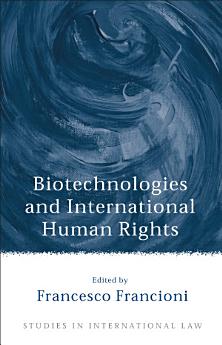Biotechnologies and International Human Rights
Francesco Francioni
Feb 2007 · Bloomsbury Publishing
Ebook
438
Pages
reportRatings and reviews aren’t verified Learn More
About this ebook
This book follows and complements the previous volume Biotechnology and International Law (Hart 2006) bringing a specific focus on human rights. It is the result of a collaborative effort which brings together the contributions of a select group of experts from academia and from international organisations with the purpose of discussing the extent to which current activities in the field of biotechnology can be regulated by existing human rights principles and standards, and what gaps, if any, need to be identified and filled with new legislative initiatives. Instruments such as the UNESCO Declaration on the Human Genome (1997) and on Bioethics and Human Rights (2005) are having an impact on customary international law. But what is the relevance of these instruments with respect to traditional concepts of state responsibility and the functioning of domestic remedies against misuse of biotechnologies? Are new legislative initiatives needed, and what are the pros and cons of a race toward the adoption of new ad hoc instruments in an area of such rapid technological development? Are there risks of normative and institutional fragmentation as a consequence of the proliferation of different regulatory regimes? Can we identify a core of human rights principles that define the boundaries of legitimate uses of biotechnology, the legal status of human genetic material, as well as the implications of the definition of the human genome as 'common heritage of humanity' for the purpose of patenting of genetic inventions? These and other questions are the focus of a fascinating collection of essays which, together, help to map this emerging field of inquiry.
About the author
Francesco Francioni is Professor of International Law at the EUI, Florence and the University of Siena.
Rate this ebook
Tell us what you think.
Reading information
Smartphones and tablets
Install the Google Play Books app for Android and iPad/iPhone. It syncs automatically with your account and allows you to read online or offline wherever you are.
Laptops and computers
You can listen to audiobooks purchased on Google Play using your computer's web browser.
eReaders and other devices
To read on e-ink devices like Kobo eReaders, you'll need to download a file and transfer it to your device. Follow the detailed Help Center instructions to transfer the files to supported eReaders.






